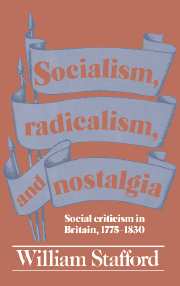Summary
Between 1775 and 1830 occurred a remarkable flowering of radical social criticism in Britain. The best writings are lively, original, powerful, and moving; when we survey them, we can see the gradual emergence of ways of thinking that have subsequently been labelled ‘socialist’, but also radical critiques that do not belong under that heading. I propose to examine ten representative texts. Texts, not authors: my concern is the range of socially radical ideas recorded in print, rather than writers and their careers. But let me begin by introducing the books and their authors.
Thomas Spence will always have the fame of a pioneer; for who is there before him? We have to go back a century and a quarter to the Diggers to find anything comparable. The Real Rights of Man was first published in Newcastle in 1775; no copy of this edition survives. The earliest we have is from 1779; there were several later editions, with minor changes, under different titles. It is a slight thing, in the quality of its argument and in length–less than three thousand words. Still, it arrests our attention. It calls upon the people, organized in parish associations, to expropriate the landlords. The democratic parishes will lease the land in small parcels, using the rents to pay national taxes and welfare benefits. Spence was untiring in promoting his plan. In 1792 he moved from Newcastle to London, there to be a notorious political activist until his death in 1814.
- Type
- Chapter
- Information
- Socialism, Radicalism, and NostalgiaSocial Criticism in Britain, 1775-1830, pp. 1 - 8Publisher: Cambridge University PressPrint publication year: 1987

